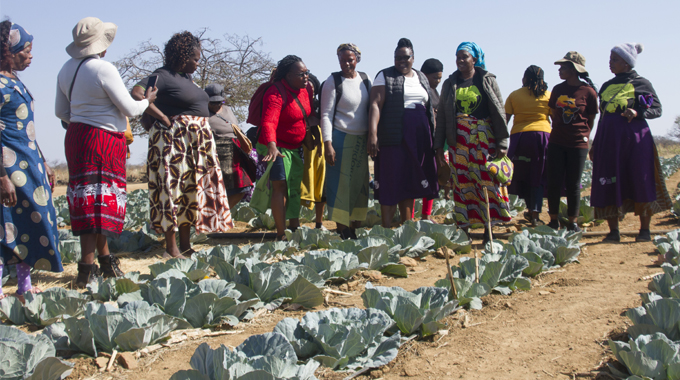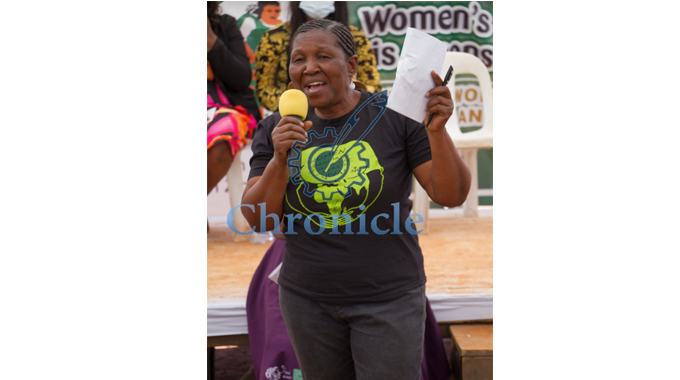The Chronicle

Lawrence Thodhlana
MOST of the food that we all eat was likely grown by women farmers who constitute the majority of agricultural workers in Southern Africa. Yet, despite women constituting 52 percent of the population and being the majority of farm workers in the region, they have access and control to less than 20 percent of the land in the region. At the turn of the millennium, frustrated by this injustice women began to form lobby groups to push for greater allocation of land rights.
Women farmers often bear the brunt of Gender Based violence (GBV) and suffer the most as a consequence of the Labour intensive nature of farming caused by climate change. In places where there is little or no mechanisation they toil away to continuously provide food for their families and communities.
 Bubi Irrigation Scheme
Bubi Irrigation SchemeIn most farming areas in Zimbabwe, women are in charge of the day-to-day running of crop and livestock production while their male counterparts, who often work in the cities, play a sort of supervisory role. However, it is the men who usually own the land and dictate from their urban bases, how proceeds from agricultural produce are used.
In 2000, 14 rural women cotton farmers from Gokwe committed suicide due to bitterness following the abuse by their husbands over money from sell of their produce. This led to the formation of an institution that would promote rights of women to land. It is the contention of the institution, Women and Land in Zimbabwe, that women should have greater access to and control over the land they work on.
Already, Women and Land in Zimbabwe has empowered members with technological and agricultural knowledge, which in turn has given them more confidence to lobby for more land rights. Since its formation in 2000, the institution has mobilised more than 31 000 rural farmers under the banner of the Rural Women’s Assembly, an affiliate of the Southern Africa Rural Women’s Assembly. The assembly is a safe platform for rural women to meet, share experiences and challenges as well as to find solutions on building resilience on political, economic , environmental and health challenges they face.
This year the RWA held its 7th National Annual Meeting after a two-year Covid-19 restriction induced hiatus. The meeting aims to facilitate a knowledge exchange platform for rural farmers. More than 2 000 members from across the country converged at Somvubu High School in Inyathi, Bubi District in Matabeleland North Province. Also, in attendance were regional members of the SARWA.
The assembly also promotes software programmes that have empowered rural women to advocate for leadership positions. Bubi District is characterised by high temperatures and low rainfall which has become more erratic due to climate change. Women and Land in Zimbabwe with support from the LED and the Government of Zimbabwe established a 30 hectare solar powered irrigation scheme. Established in 2019, Buhlebuzile scheme has a 12 000 litre per hour pumping capacity.
The availability of water has given life to the 82 members of the scheme who are now carrying out horticulture and livestock farming. Chairwoman of the scheme Phephelaphi Bishop, appreciated the role the traditional leadership played in availing land for the scheme. “Our traditional leaders have been very supportive of our projects as they have allocated over 30 hectares to us for the scheme. We have been allocated land to build our homes around the scheme as a security measure”, said Bishop.
“We appreciate Women and Land in Zimbabwe for the assistance they have rendered to us as we are now food secure. We also acknowledge the technical support we receive from Agriculture Extension Officers in ensuring good harvests and farming practices”, she added.
 Makoni Rural district councillor, Theresa Marweyi
Makoni Rural district councillor, Theresa MarweyiMakoni Rural district councillor, Theresa Marweyi, is one of the six councillors who benefited from the assembly’s solidarity drive where members are encouraged to rally behind their own. At 70 years old, a school dropout Theresa never imagined that she could run for and occupy political office. “As a mother to 12 children and a grandmother to 23, l thought that my life had run its course and never imagined myself getting into politics. The Rural Women’s Assembly really enlightened and inspired me to aim for the sky so l ran for office, said Clr Marweyi.
“I am currently the gender focal person for my council. Due to the work l am carrying out with my team, Gender-based violence (GBV) cases have significantly reduced, ” she added. GBV is a social vice that is linked to poverty as spouses wrestle to control the little available resources. GBV is being exacerbated by negative effects of climate change such as heat and excessive rain induced drought. It is imperative that rural farmers formulate coping mechanisms. Farmers at the national meeting exchanged knowledge about drought resistant indigenous seeds.
Ms Norah Mlondolozi, a member of the South Africa Rural Women’s Assembly implored governments to promote seed exchange though the relaxation of export restrictions on indigenous seeds between African countries. “Our seeds are our medicine. We are challenging the African Union to facilitate the free flow of our seeds. It is sad that as restrictions on indigenous seeds persist, genetically modified foods and seeds are being spread and shared across the continent with ease”, she said.
 Ms Norah Mlondolozi
Ms Norah MlondoloziClimate change is ravaging rural communities as they are more vulnerable than urban dwellers due to reduced income. Rural farmers heavily rely on rain fed agriculture hence they are coming up with coping mechanisms to capitalise on the reduced and erratic rain patterns. The two day annual meeting was characterised by women exchanging knowledge on water harvesting through methods such as mulching and conservation farming.
As a way of bringing relief to the hard hit rural women farmer, Liechtensteinischer Entwicklungs-Dienst (LED) is funding solar powered irrigation schemes in Matabeleland South, Matabeleland North, Manicaland and Midlands Province covering a total of 36 hectares to the tune of US$1.6 million. Regional Country Representative Ms Elizabeth Atzinger, emphasised the key role the humanitarian sector plays in complimenting government initiatives in hunger and drought mitigation.
“As we live in an era of climate change, solar powered irrigation is key to increasing food production thereby enhancing food security, income and improving community resilience. Irrigation farming increases not just the yield per hectare but also the diversity of crops that can be grown and food that can be produced throughout the year,” said Ms Atzinger
 Regional Country Representative Ms Elizabeth Atzinger
Regional Country Representative Ms Elizabeth Atzinger“The irrigation schemes are resulting in improved crop production, increased income, and improved resilience against dry spells. These are key for women empowerment as they reduce their labor burden and save time enabling them to be more on productive economic activities,” she added.
Director in the Ministry of Lands, Agriculture, Fisheries, Water, Climate and Rural Development, Mr Dumisani Nyoni noted that irrigation schemes are a key drought mitigation initiative.
“Government values support in terms of agriculture infrastructure from development partners as this compliments its efforts towards achieving Vision 2030 of achieving a middle to upper income economy. This work is also contributing towards building inclusive economic growth for all citizens”, said Mr Nyoni.
“As women constitute 52 % of the total population and with the majority of these living in rural areas where they are responsible for producing and processing food crops, the schemes will ensure that women contribute to our economy whose backbone is agro-based.”
Article Source: The Chronicle
